CHECK OUT OUR BLOG
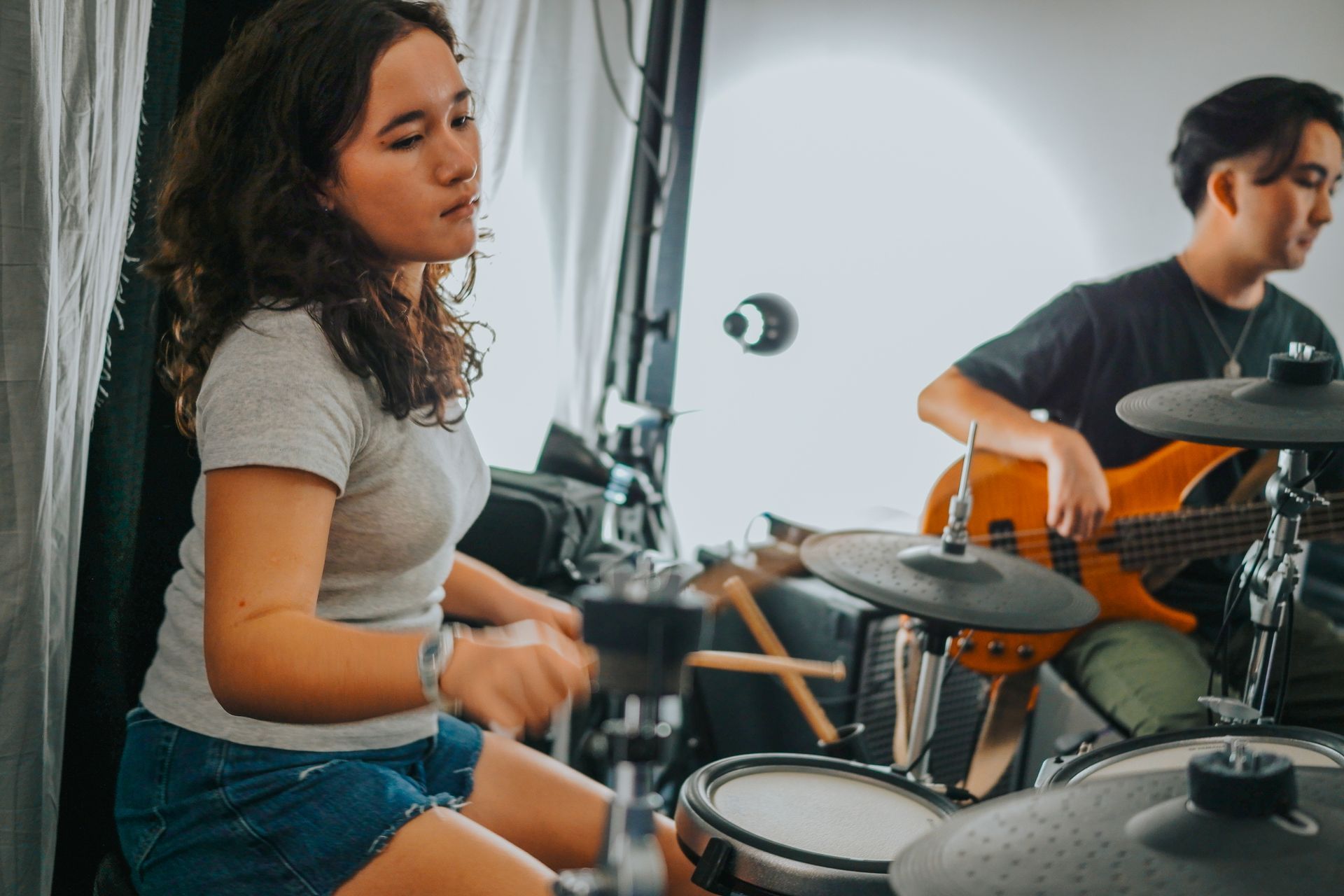
🥁 The Drummer: The Human Metronome (and Sometimes the Therapist) Drummers don’t just keep time — they create it. They’re the ones who bring order to the noise, setting the pulse that everyone else rides on. They count everyone in, anchor every tempo change, and somehow stay calm while the band argues over whether the ending should be “one more time” or “two more times but quieter.” Drummers tend to be steady, patient, and unflappable — which is why they quietly run the whole operation. Without them, the rest of us would still be clapping on 1 and 3. 🎸 The Guitarist: The Emotion Engine If drummers are the heartbeat, guitarists are the mood swing. They can make a song swagger, ache, or roar — sometimes all in the same verse. Most guitarists have a playful confidence about them. They like to experiment, push buttons (literally and figuratively), and make faces when they find “that” sound. They’re explorers — always chasing tone, volume, or a solo that makes everyone look up. Every band needs that spark — the person who keeps things exciting and slightly unpredictable. 🎤 The Vocalist: The Brave One It takes guts to stand in front of people and just… sing . No instrument to hide behind, no pedals to tweak, no sticks to spin. It’s all you. Vocalists are the storytellers — the ones who translate what the song means . They often bring big personalities, big feelings, and occasionally, big opinions about which song should open the set. But when they connect — when the nerves settle and the mic becomes an extension of their heart — that’s when the band truly comes alive. 🎹 The Pianist/Keyboardist: The Quiet Genius Every band has one: the musician who somehow knows everyone’s part better than they do. The keyboardist fills the gaps — harmony, rhythm, melody — whatever the song needs, they’re already there. They usually have a calm presence, content to make the others sound good rather than hog the spotlight. But their playing is what makes the band sound “complete.” And when they do take a solo? Everyone listens. Because they earned that moment. 🎸 The Bassist: The Glue If you’ve never paid close attention to the bass, try listening to your favorite song without it. Everything suddenly feels hollow. The bassist ties the drummer’s groove to the guitarist’s rhythm — connecting rhythm and melody like invisible thread. Bass players are the diplomats of the band: observant, balanced, and quietly holding the fort while everyone else experiments. They don’t need to be loud to be powerful. They already know their impact is felt, not announced. 🎶 The Big Truth: The Band Is a Team Sport Ask any musician what they’ve learned from being in a band, and they’ll tell you — it’s not just about playing your part. It’s about listening . Learning when to lead and when to pull back. When to fill space and when to leave silence. It’s about trust — trusting that your bandmates will come in on time, hit their cues, and have your back when you blank on a lyric. The magic happens when they stop thinking about their parts and start thinking about the song. That’s when the drummer, the guitarist, the vocalist, the pianist, and the bassist stop being a collection of instruments and start becoming a single voice. And honestly? That’s the best part of what we do — watching students go from “my song” to “our song.” Because whether you’re behind the drums or holding the mic, the real music doesn’t happen alone. At Hawaii MusicWorks, we’ve seen every version of a band — from shy first-timers to confident performers — and every one of them teaches us something new about teamwork, creativity, and connection.
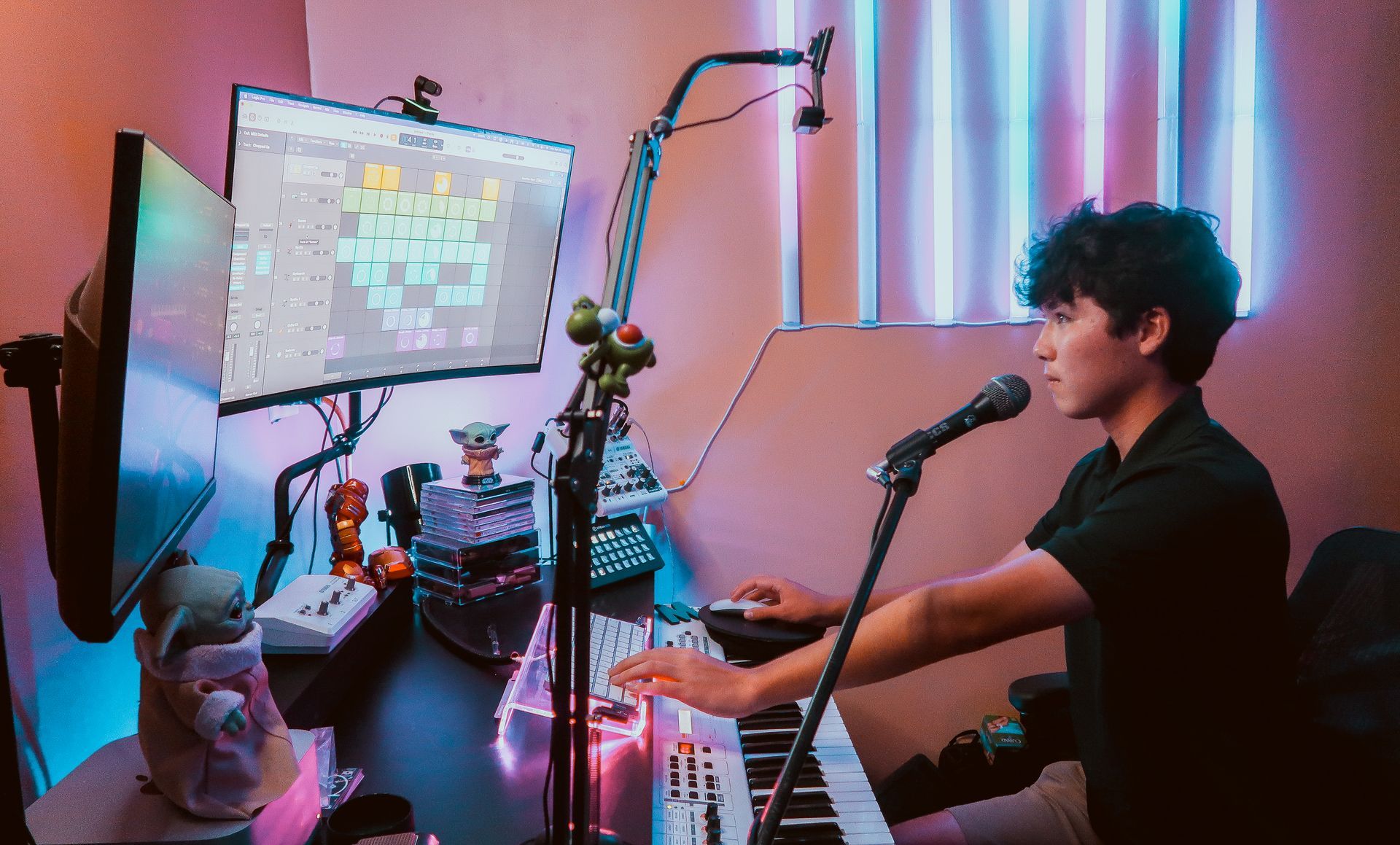
Who Should Take Up Music Production? 1. Anyone Who Loves Music and Wants to Create Their Own You don’t need a background in performance or theory. If you enjoy music and get excited about the idea of shaping your own sound—even just for fun—production gives you the tools to start creating right away. 2. Traditional Musicians Wanting to Grow Their Skills If you already play piano, guitar, drums, or sing, production takes your musicianship to a whole new level.
You learn how songs are structured, how instrumentation works together, and how to record yourself professionally. It’s like giving your musical toolkit a turbo boost. 3. Adult Learners and Creative Hobbyists Maybe you’ve raised kids, wrapped up a demanding career, or finally have time for yourself. Production is a wonderfully flexible, low-pressure creative outlet.
No performances, no recitals—just pure creative play. 4. The “I Always Wanted to Try This” Crowd You’d be amazed how often adults whisper:
“I’ve always been curious about how music is made.”
Production lets you explore that curiosity at your own pace, with guidance, without needing a background in tech. 5. Content Creators, Podcasters, and Small Business Owners Clear audio matters. Learning basic production skills makes your content sound polished and professional—no need to hire an outside editor for every project. 6. Retirees Looking for a Creative Challenge Music production is incredible for brain health, creativity, and joy.
It also provides a sense of progress and discovery—something adults often crave but don’t always get from traditional hobbies. 7. Kids Who Love Tech, Sound, or Creative Play Some kids aren’t drawn to scales or practice books, but put them in front of a digital audio workstation and they come alive.
Production gives them a modern entry point into musicianship. 8. Anyone Interested in Career Skills Audio editing, mixing, sound design, and production are all real-world, employable skills in fields like: film and video gaming streaming and broadcasting podcasting performing arts content creation recording and engineering Even a beginner course builds a foundation that students of any age can grow from. Why Should Someone Take Music Production? 1. Because It Lets You Create Music Without Limits You can compose entire songs—even if you don’t play multiple instruments.
You become the arranger, the composer, the band, and the engineer. 2. Because It Makes You a Better Musician Production sharpens your ear, refines your timing, improves your understanding of rhythm and harmony, and expands your creativity. 3. Because It’s Accessible You don’t need a full studio or thousands of dollars of gear.
With the guidance from our course and just a few key tools (all outlined for students), you can produce high-quality work right from home. 4. Because Your Ideas Deserve to Be Heard Everyone has musical ideas humming around in their mind—melodies, grooves, moods.
Production is how you turn those sparks into something real. 5. Because It’s Incredibly Fun Layering tracks, experimenting with effects, recording instruments, and shaping a piece of music from scratch is deeply satisfying at any age. 6. Because It Builds Confidence Finishing your first song—even a simple one—creates a moment of pure “I made this!” pride.
That feeling? It doesn’t belong to kids alone. Adults need that spark just as much. So… Is Music Production Right for You? Ask yourself: Does the idea of creating your own music excite you? Are you curious about how songs are built behind the scenes? Do you enjoy learning new things (at your own pace)? Are you looking for a creative outlet that fits modern life? Do you want to connect with music in a fresh, contemporary way? If the answer is yes to even one of these, music production might be the perfect next chapter in your musical journey. It’s not just for tech-kids, future DJs, or aspiring professionals.
It’s for everyone with a spark of creativity and a love for sound. And who knows — this might be the start of your next great passion project.
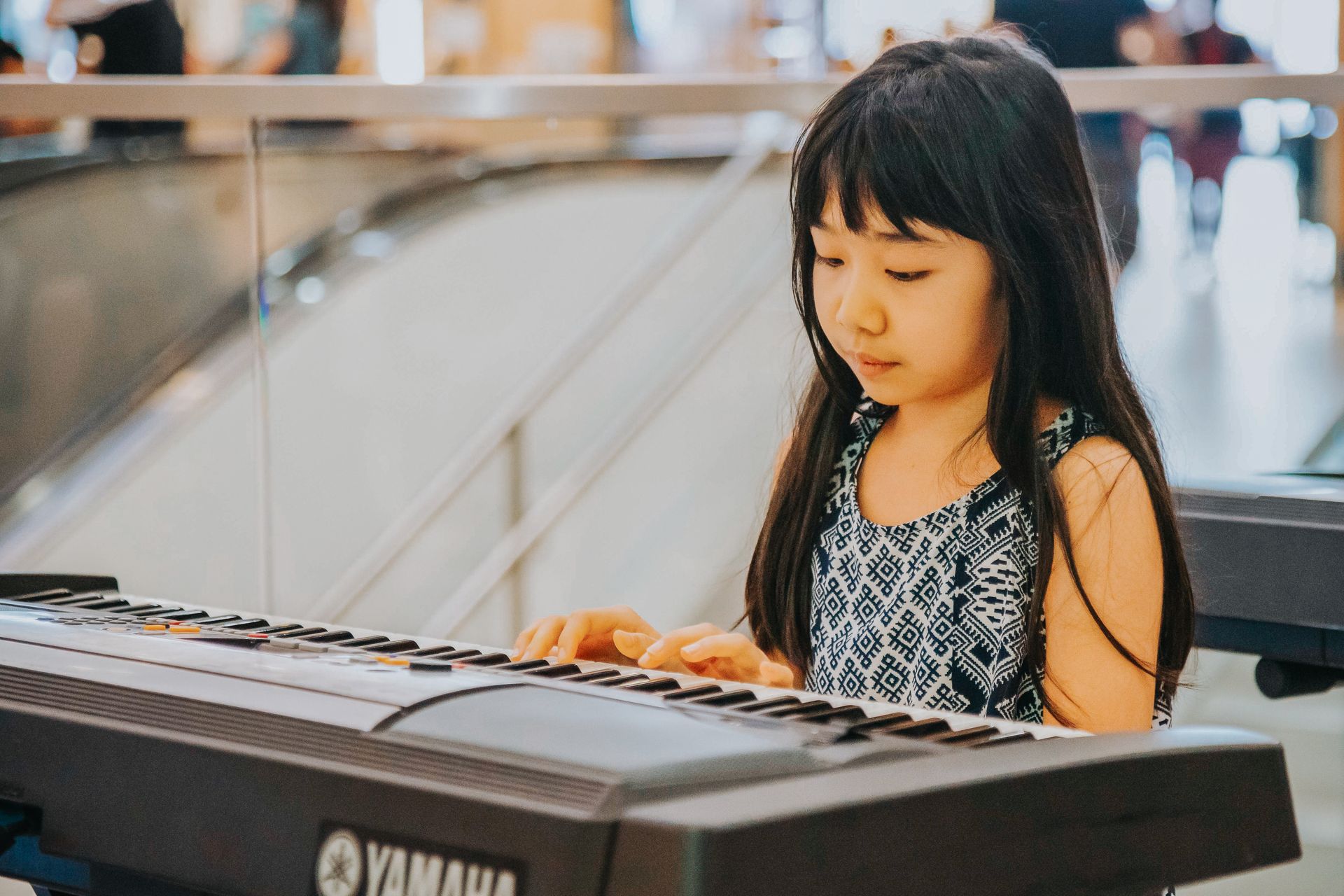
“We’re Just Skipping a Few Weeks — Can We Pause Our Tuition?” Here’s what that usually means: A student wants to skip lessons for a few weeks (or a month). The family wants to not pay tuition during that time. But they’d also like to keep their same teacher, time slot, and resume lessons later — as if nothing happened. And we totally understand why this sounds reasonable. But here’s the thing: Music Lessons Aren’t Pay-Per-Visit — They’re More Like Rent Your monthly tuition holds your spot in our program. It reserves: A dedicated time slot on your teacher’s calendar. A guaranteed spot in our limited schedule. The continued commitment of an amazing teacher who’s planning lessons, reserving time, and showing up for your child week after week. If someone pauses tuition for a month and expects to return to the same setup, either: The teacher loses income for that month, Or we cover the cost out of pocket to hold the spot, Or we give that spot to someone else , and you risk losing it. For Group Classes — The Train Keeps Moving If your child is in a group class, it's important to know: the class continues in their absence.
The group keeps learning, playing songs, and building on new skills. When your child returns, the teacher now has to catch them up — often one-on-one — while still teaching the rest of the group. That extra time and effort falls entirely on the teacher, and it’s tough to keep the whole group moving forward while helping one student play catch-up. Group classes work best when everyone shows up and grows together — consistency is key! Imagine This: You go to your favorite preschool and say,
“We’re traveling for two weeks — can we not pay for June, but keep our child’s spot and come back in July?”
Most would say no — because your tuition is what holds that space, whether you're there or not. Same goes for your favorite gym or dance studio — monthly tuition keeps things running, regardless of attendance. So What Are Your Options? We want to work with you, and we always try to be flexible within reason. If you have to miss a few weeks, we offer: 🧳 Asynchronous options like recorded assignments 📅 Or you can withdraw and re-enroll when ready — but we can’t guarantee the same spot or teacher will be available later. Bottom Line: We’re not trying to be rigid — we’re just trying to make sure our teachers are respected and paid fairly, and that our schedule stays sustainable for everyone . And when students attend consistently, they progress faster, stay more motivated, and get the most out of their musical journey. Thanks for understanding — and thank you for being part of our music ‘ohana! 🎶
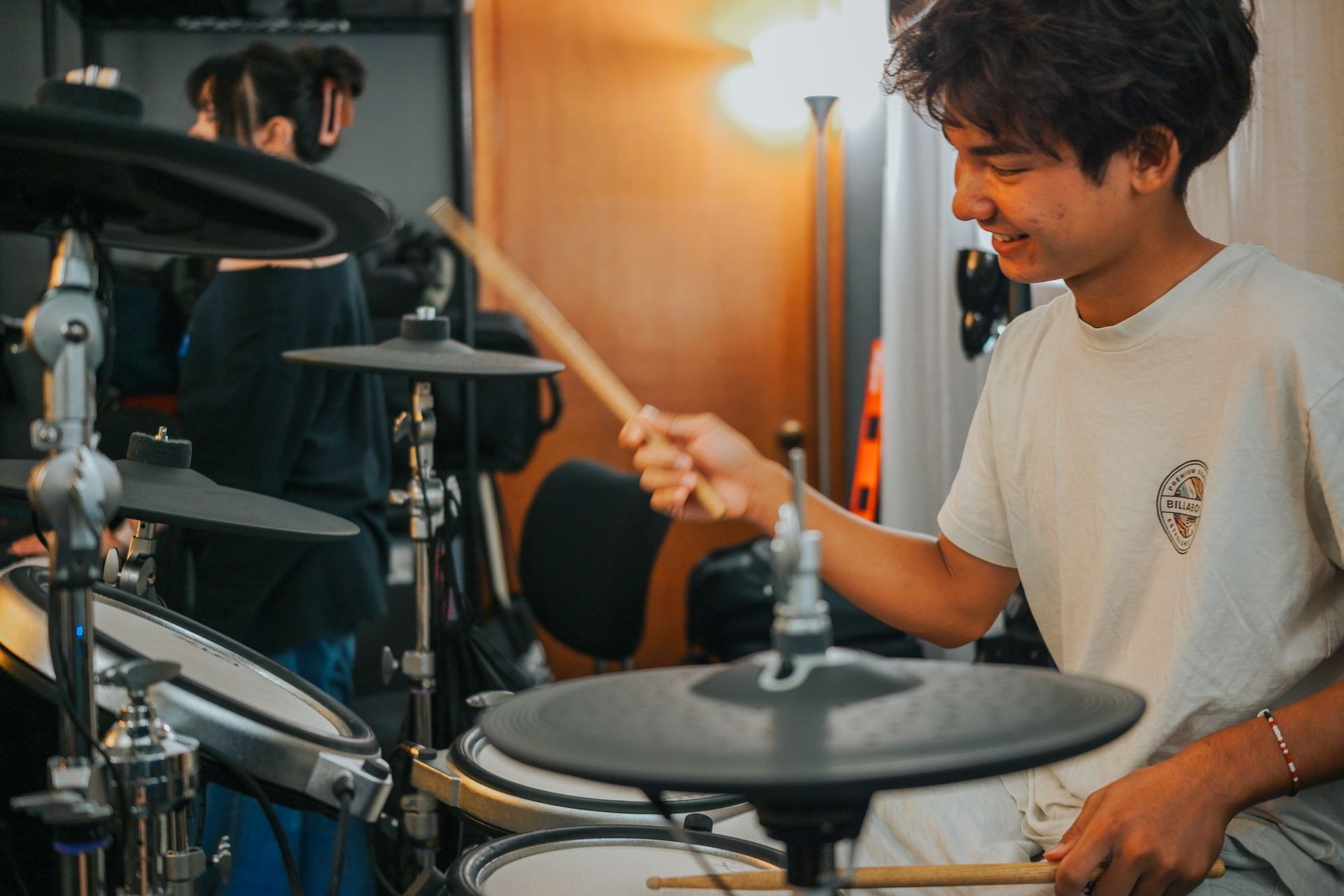
1. Lower the Barrier to Entry If it takes 10 minutes just to set up the keyboard, plug in the amp, or dig the guitar out from under a pile of laundry—guess what? Practice probably isn’t happening. Make it as easy as humanly possible to start. Leave the keyboard plugged in and accessible. Put the music stand right there. Store the guitar on a stand, not in a case buried in a closet. Keep books and assignments in a visible spot—not crammed into a backpack or under the bed. If you can reduce friction, you’ll reduce resistance. 2. Set the Scene, Not the Stopwatch Practice doesn’t have to mean “30 minutes of uninterrupted musical bliss.” (Let’s be real—that’s not even how most adults work.) Instead, try creating a practice-friendly window in your day:
“Hey, we’ve got 15 minutes before dinner—let’s work on that one song your teacher marked.”
Or: “Right after homework, let’s do a quick run-through of the part that tripped you up.” And if you need permission to let go of the timer: You have it. 3. Focus on the Assignment, Not the Clock Many students think “practice” means playing all their songs straight through and calling it a day. But what they really need is to zoom in on the hard parts. Did the teacher circle one measure to repeat? Do that—like, really do it. Is there a rhythm pattern that’s still fuzzy? Clap it out. Count out loud. Is the song 90% there but the last phrase always falls apart? Start there, not at the beginning. A five-minute drill on the right thing is more valuable than 20 minutes of autopilot. 4. Keep It Regular—Not Perfect A little progress every day beats heroic weekend cramming. If students can get in the habit of touching their instrument most days of the week—even if it’s short and sweet—they’ll stay connected. Miss a day? It’s fine. Just pick it back up tomorrow. The point isn’t perfection—it’s momentum . 5. Make It Fun (Even If Just a Little) Sometimes, especially when motivation is low, the best thing to do is let them play something they love . Not the assignment. Not the warmups. Just something that feels good. Even five minutes of “free play” keeps their brain wired for music and helps keep the spark alive. (Bonus: it reminds everyone why they started lessons in the first place.) 6. Model the Mindset Parents, we see you. You’re tired. You’re juggling school pick-ups, reheating dinner, and probably forgot about Spirit Week until five minutes ago. But here’s the thing: your attitude toward practice sets the tone. If it’s always a battle or a box to check, that’s how your kid will see it too. Try this instead: “Let’s just do a little bit together.” “Hey, you want to show me what you’re working on?” “I know it’s hard—can we try it together for five minutes and see how it goes?” That small shift—from enforcement to encouragement—can change everything. 7. Don’t Procrastinate—Cramming Doesn’t Work We know how it goes: the lesson is tomorrow, and suddenly the motivation hits. Time to panic-practice for an hour and hope for the best! But here’s the truth: cramming is way more exhausting than practicing in small, focused chunks throughout the week. It’s like trying to brush your teeth for 30 minutes the night before a dentist appointment. It doesn’t work—and it just leaves everyone stressed out. The night before a lesson shouldn’t be an emergency.
Ideally, it’s just a quick run-through to stay fresh: “Let’s review what we worked on.” “How does this part feel now?” “Anything we want to ask the teacher tomorrow?” Spread out your effort over the week, and practice becomes lighter, easier, and—dare we say— actually kind of fun . Final Thought Smart practice isn’t about time—it’s about intentionality . And it doesn’t have to be a huge production. In fact, the more regular and low-stress it becomes, the more your student will grow—not just as a musician, but as a focused, resilient, and creative human. And if you need help building that routine, ask us. That’s what we’re here for. Let’s make practice something that works in real life—not just in theory.
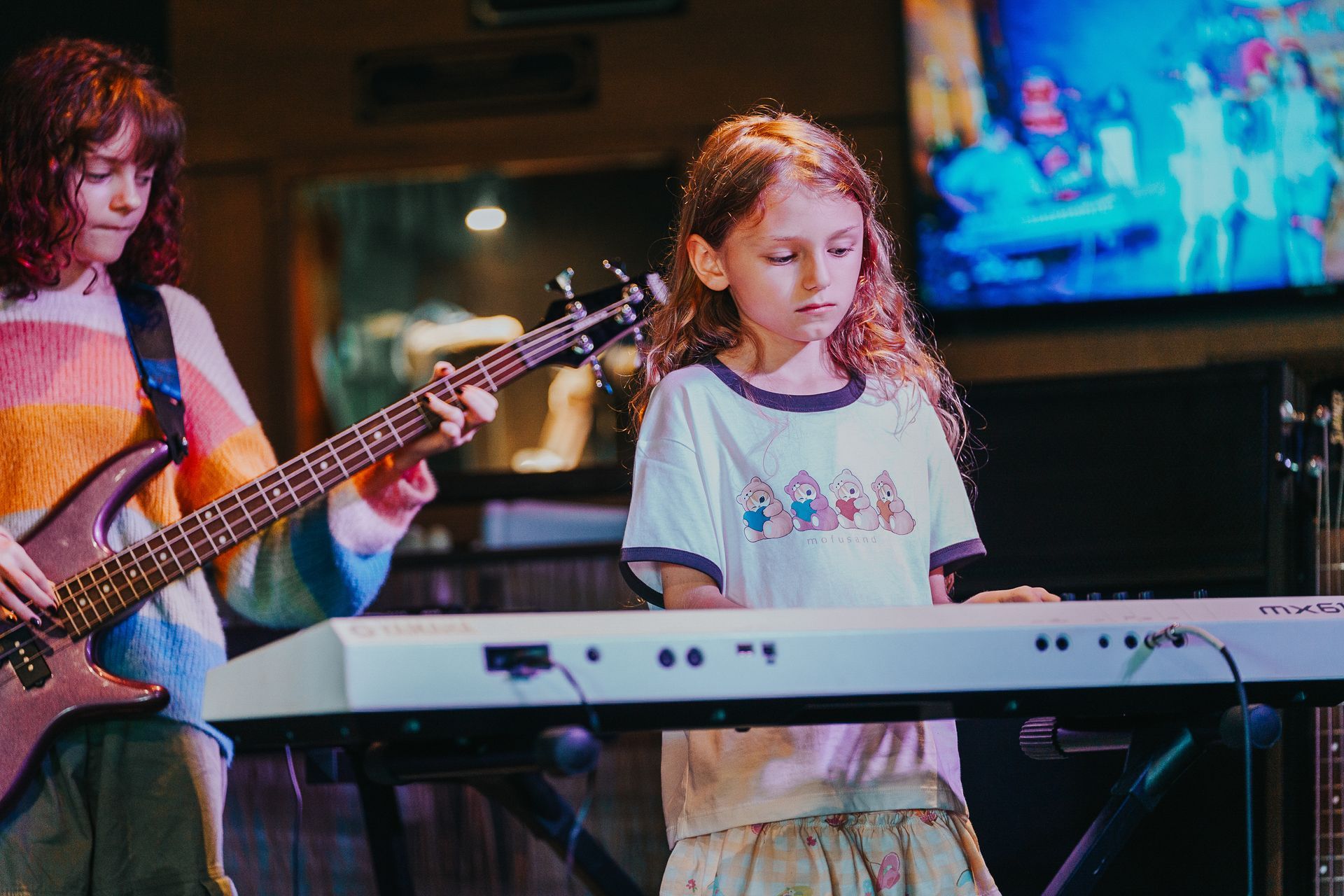
Parents often ask, “When is the recital?” as soon as their child starts lessons. It makes sense! After all, when kids start sports, there are games; when they start dance, there are performances. So, naturally, parents assume music lessons will lead straight to a recital. But here’s the thing—sometimes, students need a little time to get their footing before they’re ready to take the stage. And forcing a recital too soon can turn a fun learning experience into a stressful one. So, when is the right time for a recital? And how do you know if your child is truly ready? Let’s dive in! Why Parents Are So Excited About Recitals We get it. Watching your child play an instrument is exciting! You’ve invested time driving them to lessons, possibly spent a small fortune on an instrument, and you’re eager to see the results. A recital feels like the perfect way to celebrate their progress. But learning an instrument isn’t an overnight process. The first few months (or even the first year) are all about getting the basics down—learning how to hold the instrument, read music, and play simple songs. Rushing into a recital too soon can make a child feel pressured before they even have a chance to feel confident. The Right Time for a Recital Every child is different, but here are a few signs that they’re ready to take the stage: 🎵 They can play a song all the way through without stopping. A recital isn’t just about getting through a piece—it’s about playing it smoothly and confidently. 🎵 They understand musical basics. Things like rhythm, note reading, and playing with good technique all need to be in place before stepping in front of an audience. 🎵 They’re excited (or at least willing) to perform. Some kids are natural performers, while others get nervous. A little stage fright is normal, but if a child dreads the idea of playing in front of others, it might be best to wait. 🎵 They’re okay with extra practice. Preparing for a recital means going beyond just playing the notes—it means refining the piece, polishing the dynamics, and adding a little flair. If a student isn’t ready to put in the extra effort, it might not be the right time. The Right Reason for a Recital A recital should feel like a win —a way for kids to celebrate their hard work and musical growth. What it shouldn’t feel like is an obligation or a way to prove their progress to others. A well-timed recital helps kids: ✨ Feel proud of themselves. There’s nothing like hearing an audience clap just for you! ✨ Build confidence. Each successful performance makes playing in front of others easier in the future. ✨ Learn valuable skills. Recital prep teaches patience, perseverance, and how to stay focused under pressure (skills that are useful in everything). Why Recitals Can Pause Other Progress One tricky part about recitals? Preparing for one means pressing pause on learning new material. Instead of moving forward with new music and skills, a student has to focus on polishing a performance piece. That’s not a bad thing—it’s actually a great skill to develop! But if a child is in the middle of a big growth spurt in their playing, stopping to fine-tune a recital piece might slow that momentum. That’s why some teachers hold off on recitals if a student is making big strides and don’t want to disrupt the flow. Make It About the Music, Not Just the Show At the end of the day, a recital should be a celebration , not a source of stress. If a child is excited, prepared, and ready to shine, then go for it! But if they need more time to grow before stepping into the spotlight, that’s okay too. Music isn’t just about performing—it’s about creativity, expression, and personal progress. And when the time is right for a recital, it’ll be that much more special. 🎶✨
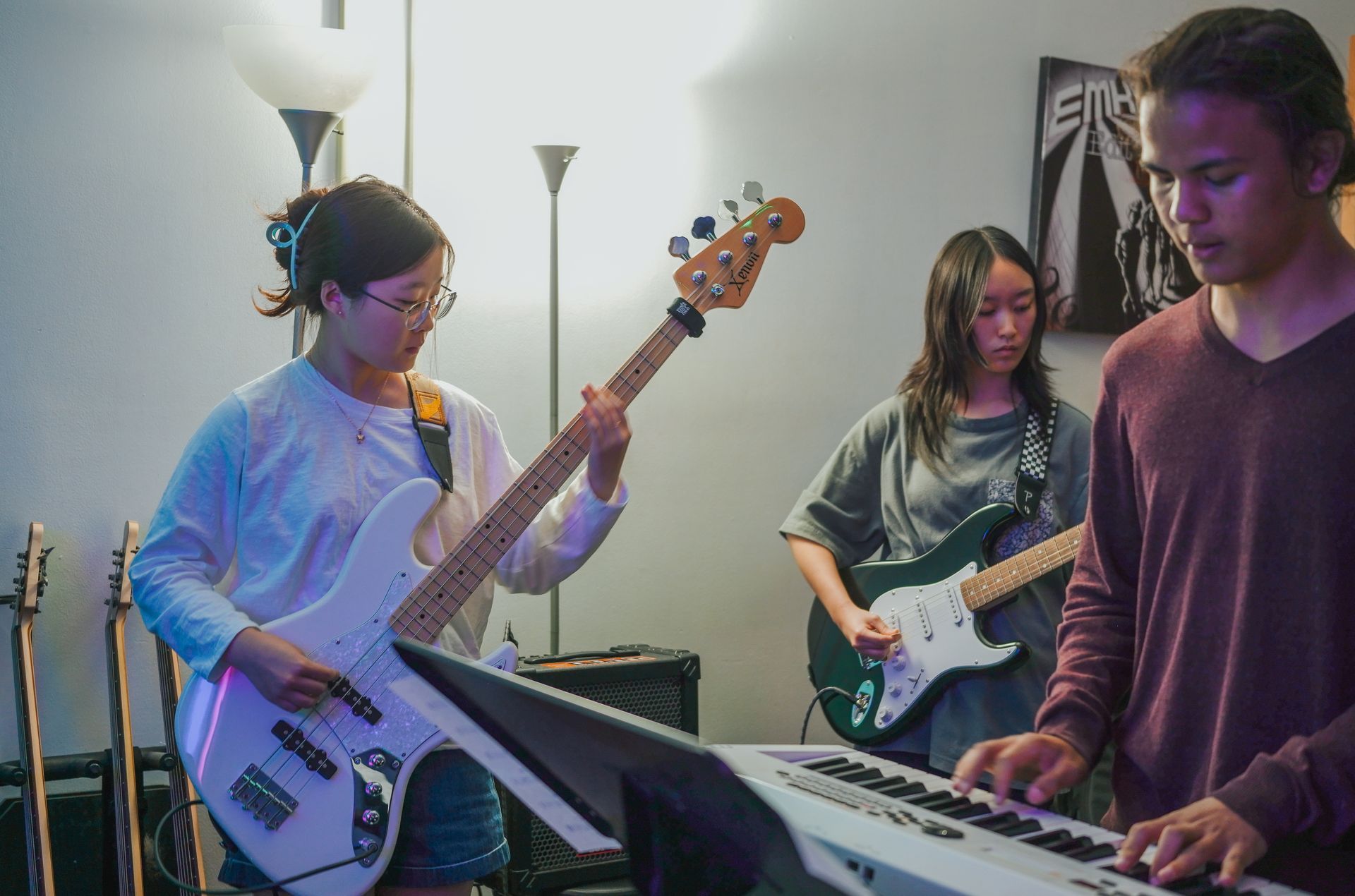
If you’ve never been in a band, imagine a group project—but louder, more emotional, and with actual amps involved. It’s glorious chaos. And also, weirdly, the perfect training ground for life. Here’s what I’ve learned from watching hundreds of kids (and a few brave adults) show up for their bands—and what I hope they take with them long after the final note fades. 1. Show Up (For Real) It’s not enough to just be there. Being in a band means showing up on time, with your stuff, ready to go . But more than that—it’s about showing up with heart. Ready to try. Ready to fail and try again. Ready to make someone else's part sound better, not just your own. You can’t coast in a band. Not for long, anyway. If you didn’t practice? We all hear it. If you’re checked out? Everyone feels it. You quickly learn that being unprepared doesn’t just hurt you—it lets everyone down. 2. Pull Your Weight There’s no “backup” drummer. No “optional” bass player. (Well, unless you want the band to sound like a sad campfire sing-along.) Everyone matters. You matter. Your contribution—however small it may seem—is essential to the bigger sound. And here’s the kicker: nobody can play your part for you . You’ve got to own it. That solo you didn’t think you could nail? That harmony that sounded wobbly last week? If you want the band to succeed, you’ve got to do your part. It’s the best kind of pressure. The kind that makes you rise. 3. Listen Louder Than You Play The best musicians aren’t just shredders—they’re listeners. They pay attention to what the band needs, not just what they want to play. Sometimes that means playing softer so someone else can shine. Sometimes it means biting your tongue when someone flubs a part (because you’ve been that person too). In a band, you learn quickly that the spotlight moves. It’s not always about you. And when it is? You want to be the kind of player others are excited to lift up—not someone they’re quietly hoping will just drop out. 4. Be Flexible, Not Flaky Rehearsals don’t always go as planned. Sometimes someone forgets their gear. Sometimes a song just isn’t working and you have to scrap it. In band life (and real life), you learn to pivot. To try new things. To let go of perfect and lean into progress. But flexibility isn’t the same as flakiness. Your bandmates need to know they can count on you— even when things are hard . Especially then. There’s a big difference between “let’s try it a new way” and “I didn’t feel like practicing so I’ll just wing it.” 5. Celebrate the Weirdness Band kids? They’re quirky. They’re bold. They’ve got opinions about guitar tones and favorite snare heads. And you know what? That’s what makes a band work . Everyone brings their flavor. The quiet kid who writes lyrics like poetry. The loud one who keeps things from getting boring. The one who organizes the set list and remembers everyone’s water bottle. In a band, you learn to appreciate the weird. Not just tolerate it—but need it. Because without all those odd little puzzle pieces, the music doesn’t happen. So What’s the Takeaway? Band rehearsals teach you how to be a better teammate, a more empathetic human, and a more reliable friend. They teach you how to mess up in front of people, laugh it off, and try again. They show you how to listen, how to lead, and how to take a backseat when someone else needs to step up. We don’t always realize it in the moment—but when a kid learns to thrive in a band, they’re learning how to thrive in life. The world could use more people who know how to show up, pull their weight, and harmonize with others—even when the song changes mid-set.
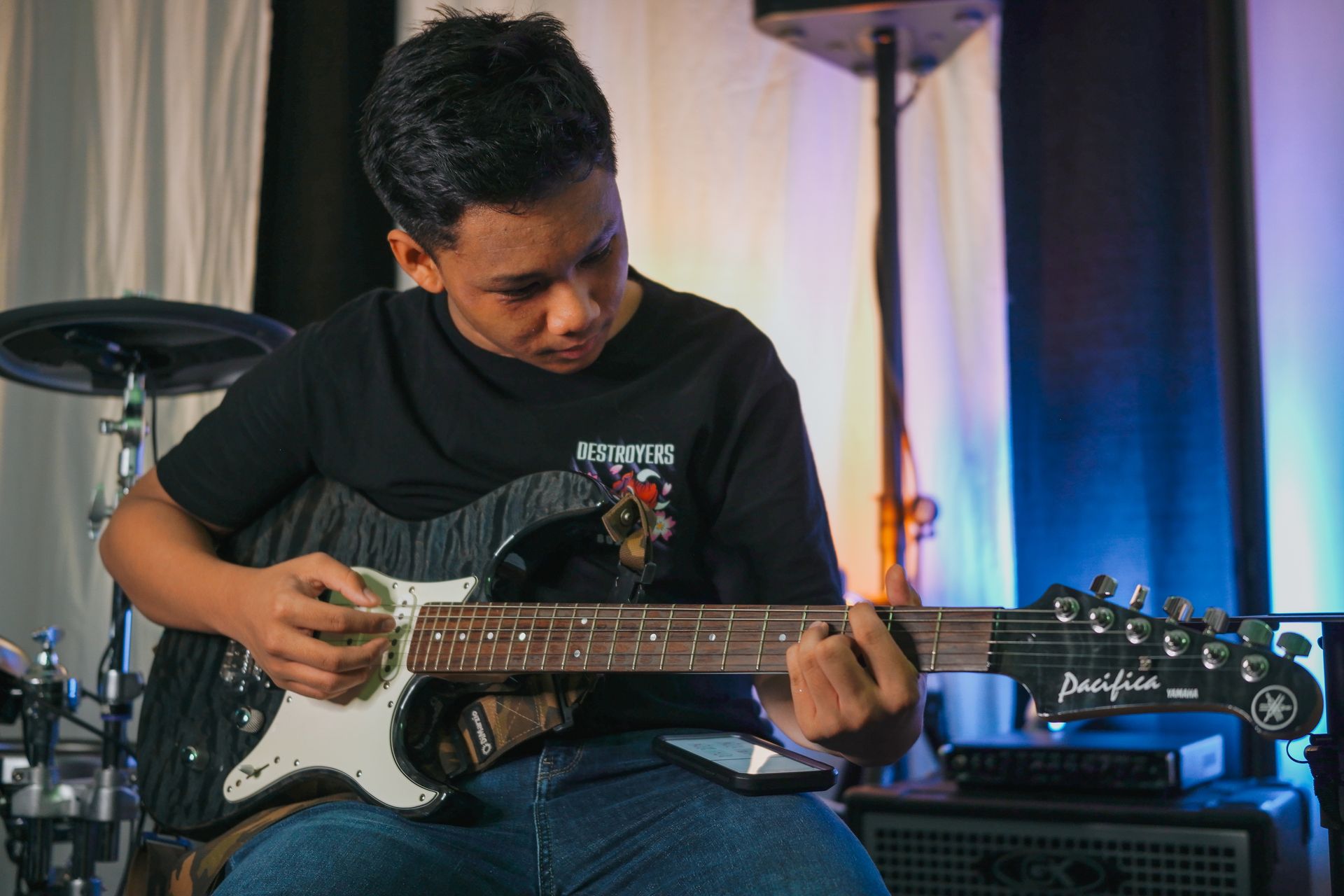
You know that moment when a kid hits the wrong note and immediately freezes, winces, or apologizes?
We see it all the time. Sometimes they laugh it off.
Sometimes they mutter, “Ugh, I’m so bad at this.”
Sometimes they shut down altogether. And every time, we say the same thing: “Good. Now we’ve got something to work with.” At Hawaii MusicWorks, we don’t just tolerate mistakes — we encourage them. Because if you’re not messing up, you’re not really learning. And let’s be real — no one ever nailed a guitar solo by playing it safe. 💥 Mistakes = Data Mistakes are information . They tell us: Where the student’s confidence dips What needs more practice Where muscle memory hasn’t kicked in yet That “oops” moment? It’s not failure. It’s a neon sign that says, “Let’s look at this part together.” If a student never messes up, we assume they’re either (A) not being challenged enough or (B) hiding behind what’s easy. 🧑🎓 A Note to Parents: Please Don’t Do the Homework We say this with love:
If your child turns in a perfectly written theory assignment, and you “helped a little,” we can usually tell. But here’s the thing — we don’t want perfect papers. We want to see what they don’t understand yet . If everything is filled out correctly but they can’t explain it in class, we know it’s not sticking.
Mistakes on homework help us figure out where to jump in and reteach.
Correct answers done by someone else? Not so much. So please: resist the urge to swoop in and clean things up. Progress is messy, and that’s okay. (And yes, it’s totally fine to encourage them to try or review together — just let the learning be theirs.) 🧠 What Happens When Kids Avoid Mistakes Perfectionism can sneak in early — especially in high-achieving kids. And when it does, it gets loud: “If I mess up, I’m not good enough.” “If I can’t play it right, I shouldn’t play it at all.” “I hate this. I’m bad at this. I want to quit.” That kind of thinking doesn’t just block musical growth — it chips away at confidence. So we work hard to reframe the mistake.
We say things like: “Cool, let’s break that part down.” “Your brain just gave up early — let’s help it stay in the game.” “That mistake means you’re in the zone where real progress happens.” 👂 What Mistakes Actually Teach Here’s what students learn when we let them mess up: Resilience – They bounce back instead of crumbling. Adaptability – They learn to recover in real time. Focus – They start noticing what their fingers, ears, and brain are doing. Confidence – Yes, confidence! Because they learn they can mess up and keep going. Bonus: These are life skills. Not just music skills. 🔁 We Model Mistakes Too Our teachers don’t pretend to be perfect — because we’re not. We flub chords. We forget lyrics. We laugh when things go sideways. We’re also usually the first ones to say, “Oops! Try that again.”) That modeling gives kids permission to relax. It tells them: “It’s okay to be where you are.” 🧑🎤 Progress Over Perfection We’re not here to raise musical robots. We’re here to raise confident, expressive, joyful musicians.
The kind who: Mess up and keep playing Take risks Get back up when they fall off the rhythm Know that perfection isn’t the goal — progress is And the truth is:
Some of the best performances we’ve ever seen weren’t perfect — but they were real . So yes, we encourage mistakes in music class. Because mistakes are where the music begins. And that moment when a student messes up, laughs, and keeps going? That’s the stuff of rockstars.
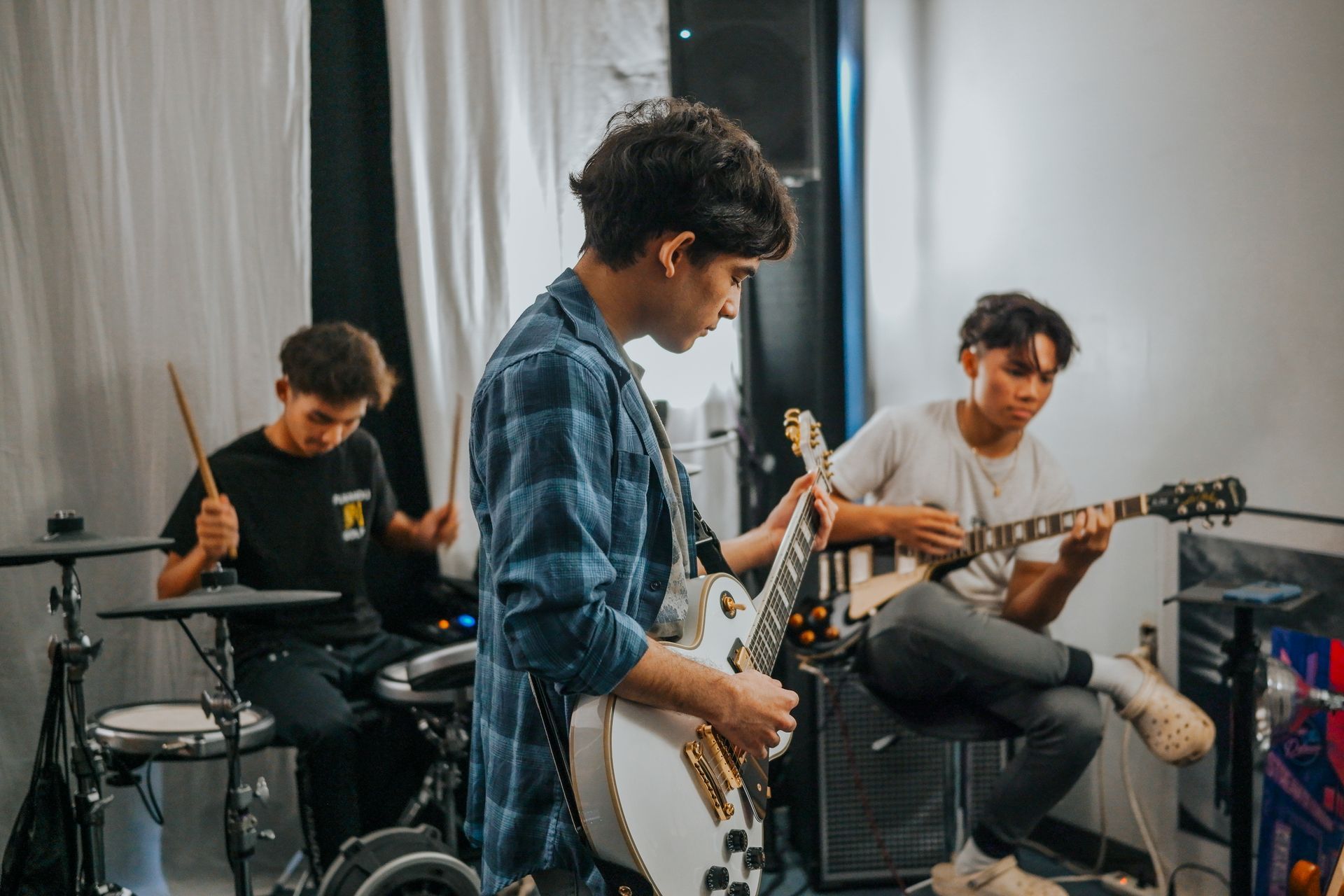
If you think our most memorable students are the ones who come in playing full concertos or shredding like mini Hendrixes, think again. The students who surprise us the most? They’re often the ones who struggle. The ones who almost quit. The ones who start out quiet, timid, distracted, overwhelmed — or totally convinced they “just don’t have it.” And then one day… something clicks. 🔥 Not always dramatically. Not overnight. But enough that we stop and think, Whoa. Look at them now. 🌱 It’s not about talent. It’s about growth. We’ve seen students who: Took months to get through their first song… and are now leading their band. Refused to sing a single note out loud… and now own the mic. Bombed their first few lessons… and now show up early, eager to help tune guitars for others. They weren’t the “naturals.” They were the ones who kept showing up. They asked questions. They got frustrated. They failed and came back again. And we couldn’t be prouder. 😬 The early days can be deceiving. Every music teacher has had this experience:
A student walks in, clearly unsure. Maybe they’re fidgety, avoid eye contact, or seem totally uninterested. Sometimes they make zero progress for what feels like forever. And you think, “Are they even enjoying this?” But then they show up early. Or they crack a joke in class. Or they nail a rhythm you know they used to struggle with. And suddenly, it’s like they’ve found their groove — literally. 🧠 Progress doesn’t always look like progress. We’ve learned to look for the small wins: They’re making fewer excuses. They’re practicing without being told. They’re starting to take pride in their playing. They’re raising their hand. Offering to go first. Laughing when they mess up instead of shutting down. That stuff? That’s gold. That’s what real growth looks like — especially in kids. 🧑🎤 The best part? They don’t even know they’re surprising us. We don’t always tell them right away. (Sometimes we’re too busy fist-pumping silently.) But when students surprise us, it’s not because they “suddenly got good.” It’s because they started believing in themselves — even just a little. And that shift? That’s the moment we live for. 💛 So if you’re the parent of the “quiet one”… the “unmotivated one”… the “still can’t remember which chord is G” one… Hang in there. Because those are the kids who sometimes blow us away the most. They’re deep thinkers. Late bloomers. Quirky creatives. Future performers with stories to tell. They may not be the loudest in the room — but when they finally plug in and turn up? It’s unforgettable.
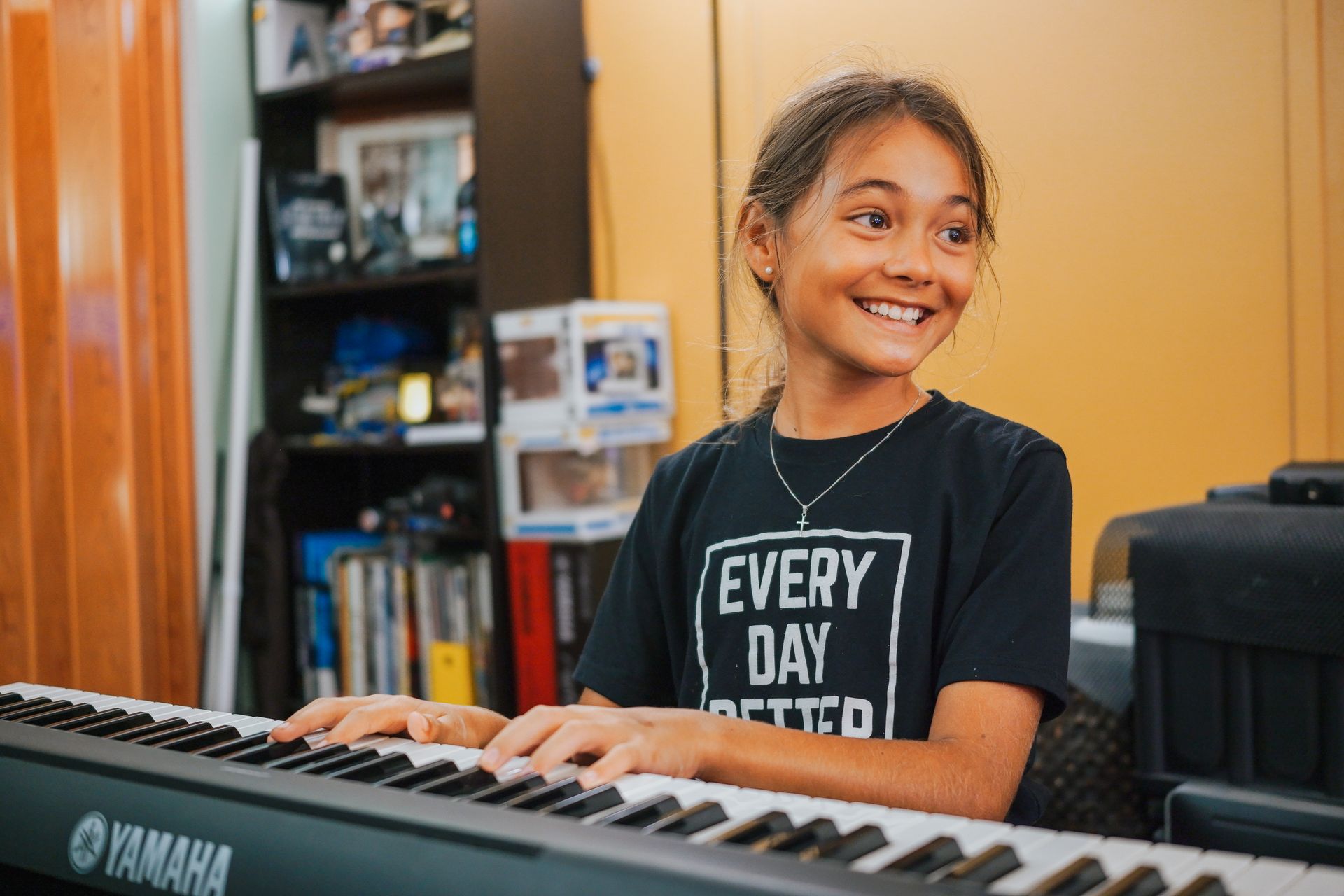
“I don’t want them to be a professional musician or anything…” We hear this a lot—from kind, supportive parents who are just trying to explain where their expectations are. (Spoiler: we’re not building conservatory bots here. We’re building humans who love music.) We also hear things like:
“They’ve got the ear.”
“He’s really talented.”
“We make them practice 30 minutes a day.” Which are all fine things to say. But if you’ve been around our school long enough, you know that none of those things guarantee a student will thrive. Some of the most naturally talented kids struggle when the music gets hard—because they’ve never had to wrestle with it. Some students practice religiously every day—and still don’t grow, because they’re just clocking time, not doing the work. So if you’ve ever wondered what actually makes a great music student at Hawaii MusicWorks, here it is: It’s Not About… Talent.
Natural ability might give a student a head start, but it won’t carry them through a song they don’t know, or a piece that just won’t click. In fact, sometimes it makes the hard parts harder—because they’re not used to having to try. Practice Minutes. We know a lot of families try to help by setting a daily practice goal—30 minutes a day is a common one. And we totally get the intention behind it. Routine, consistency, accountability? All good things. But here’s the truth:
Thirty minutes of the wrong thing doesn’t move the needle. If a student is zoning out while running through a song they already know just to “fill the time”… If they’re distracted, checking their phone between chords… If they’re practicing the wrong section of the song because they forgot what the assignment actually was… That’s not quality practice. That’s musical busywork. If practicing looks like doom-scrolling TikTok with an instrument in your lap,
we’re gonna call it what it is: a light stretch, not a workout. Real progress comes from focused, specific effort. It’s slowing things down. Targeting the hard parts. Being mentally in it, not just physically near your instrument. And yeah—it’s not always fun, but that’s the muscle we’re trying to build. The ability to stay engaged when it’s boring, tricky, or just not your favorite thing that day — That’s what separates someone who plays music from someone who grows with it. Give us five intentional minutes over thirty distracted ones any day. Performance Ambitions.
We’re not here to create future pop stars. (Unless that’s the dream—then great, we’ll help.) But our focus is growth, confidence, and a lifelong relationship with music. Not résumé building. So What Does Matter? Curiosity Students who ask questions, mess around with what they’re learning, and chase their own ideas are the ones who light up. It’s not about getting everything “right”—it’s about being engaged, creative, and awake in the process. Consistency Not “never missing a day.” Not “perfect practice.” Just—keep going. Students who show up, even when it’s tough, even when they’re busy or stuck, end up surprising themselves. That’s the muscle we care about: the one that keeps coming back. Flexibility Music is a rollercoaster. One week you’re slaying your song, the next week you forget how to count to four. Students who learn to roll with it, take feedback, and pivot? They’re golden. The Right Kind of Support When parents focus on encouragement rather than enforcement, things go way better. Ask what they’re working on. Let them show you. Celebrate the trying, not just the perfect performance. Trust the process—it’s louder and messier than you think, but it works. Final Thought At Hawaii MusicWorks, we don’t sort students into “serious” or “not serious.” We don’t rank them by talent. We meet them where they are—and we help them grow. Whether they’re here to rock the stage, write their own songs, or just have a creative outlet after school, we want them to feel seen, challenged, and proud. So if you’re wondering what makes a student “good” at music—it’s not the magic, it’s the mindset. And we’re here for all of it.

Practice is Key to Learning Music lessons typically happen once a week. That’s just 30 minutes out of 168 hours in a week. Without an instrument at home, there’s no way to reinforce what was learned in the lesson. Imagine trying to learn a sport but only touching the ball during practice—it just wouldn’t work! Regular playing time is necessary to build muscle memory, improve technique, and make steady progress. Interest Grows With Accessibility One of the biggest misconceptions is that a child (or adult) will develop interest first, and then you can invest in an instrument later. But in reality, interest often builds because they have the instrument in front of them, ready to play whenever inspiration strikes. Having easy access to an instrument allows for spontaneous playing, creativity, and exploration—all of which help fuel motivation and enjoyment. Frustration Sets In Without an Instrument Imagine signing up for swimming lessons but never having a pool to practice in outside of class. It wouldn’t be long before you felt stuck and frustrated. The same thing happens with music. Without regular practice, lessons start to feel repetitive rather than rewarding, and students may feel like they’re not improving. That’s when they lose interest—not because they don’t enjoy music, but because they aren’t able to engage with it in a meaningful way. You Don’t Need the Most Expensive Instrument Investing in an instrument doesn’t mean you have to buy the most high-end model. There are plenty of affordable beginner instruments that sound great and are comfortable to play. The key is to get something that functions well enough to make learning enjoyable. A poor-quality instrument can be discouraging if it doesn’t stay in tune or is too hard to play. If you’re unsure what to buy, ask the instructor for recommendations! Final Thoughts If you’re investing in music lessons, investing in an instrument is just as important—if not more. It’s the tool that makes learning possible. Without it, progress is slow, frustration builds, and the excitement of learning music can quickly fade. But with the right instrument at home, music lessons become an engaging, rewarding journey that can last a lifetime. So go ahead—get the instrument! Your future musician will thank you.
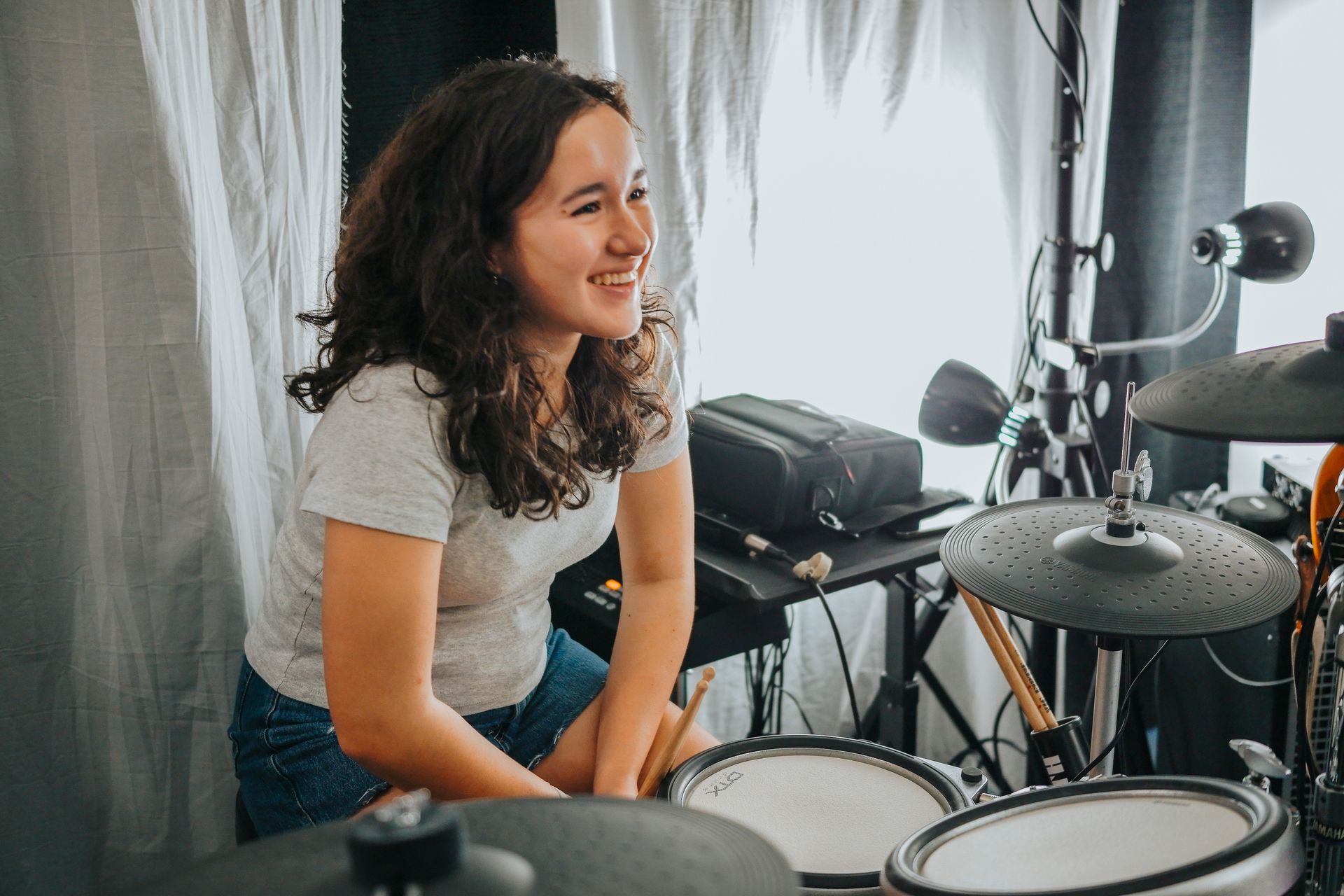
The best choice depends on their personality, learning style, and even family dynamics (because let’s be honest, a drum set in a small apartment might not be ideal!). Here’s what to consider when helping your child find their perfect match. 1. Consider Their Personality & Recommended Starting Ages Each instrument has a unique “vibe,” and some naturally suit different personalities. It’s also important to consider age appropriateness: Keyboard (Starting at Age 4+) – Great for kids who enjoy structure and patterns. It’s an excellent first instrument because it visually lays out music theory concepts and doesn’t require fine motor skills or finger strength like stringed instruments. Plus, you don’t need to invest in an acoustic piano—portable keyboards are affordable, take up little space, and often have headphone options for quiet practice. Guitar (Starting at Age 7+) – Perfect for independent and creative kids who love experimenting with sound. Since guitars require finger strength to press down on the strings, waiting until around age 7 helps avoid frustration. Drums (Starting at Age 7+) – A great fit for kids who like movement and rhythm. While younger kids love banging on things, formal drum lessons require coordination and focus, which develops around age 7. Voice (Starting at Age 7+) – If your child sings all day, why not develop that natural talent? Formal lessons start around age 7 when kids can focus and understand breath control. Bass (Starting at Age 8+) – Ideal for team players—bassists provide the foundation in a band and tend to be the steady, supportive types. Like guitar, bass requires finger strength, so waiting until at least age 8 is best. 2. Match Their Learning Style Visual learners do well with keyboard, where notes and patterns are laid out clearly. Kinesthetic learners thrive with drums, guitar, or bass. Auditory learners may love voice lessons since they rely on listening and pitch matching. 3. Think About Your Home & Lifestyle Do you have space? A full-size acoustic piano or acoustic drum set requires room. If space is an issue, consider options like portable keyboards, or drum pads. How much noise can you handle? Drums are loud, but electronic kits with headphones can help. Are you okay with carrying an instrument? Guitars are portable; pianos… not so much! 4. Let Them Try Before Committing If your child is excited about music but unsure where to start, we can help! Our teachers can provide an introductory session where your child gets hands-on experience with multiple instruments to see what feels right. Sometimes, just a little trial time can help them make the best choice. 5. Support Their Choice (Even If It’s Unexpected!) Maybe you pictured your child playing classical keyboard, but they’re drawn to electric guitar. That’s okay! Supporting their choice increases their motivation to stick with it. The right instrument should inspire your child—not feel like a chore. With a little guidance, you can help them find their musical passion!
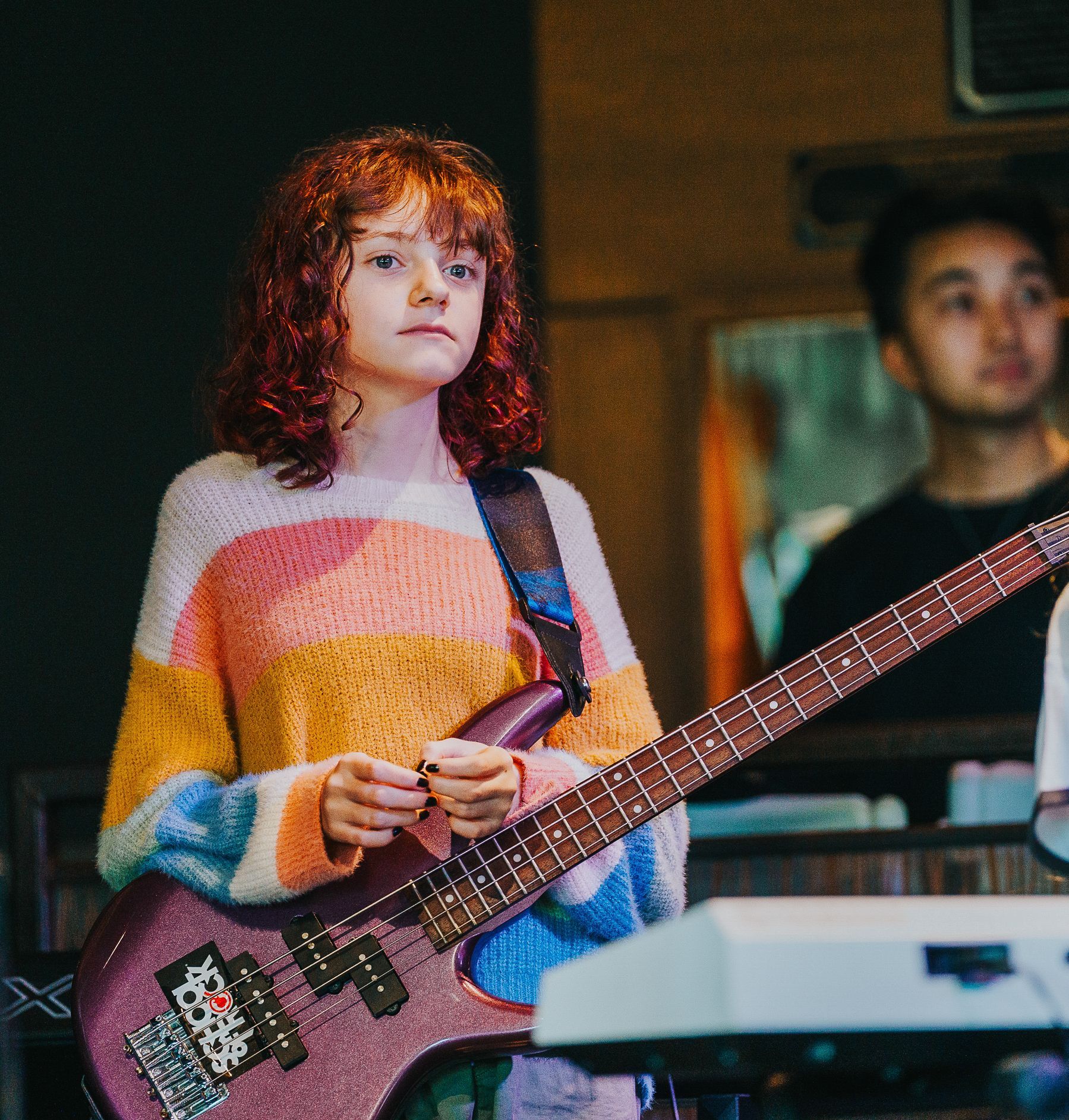
If you’ve ever said, “Let’s wait and see if they like lessons before we buy an instrument,”
you’re not alone — and I don’t blame you! Music lessons are a commitment. You want to be sure your child enjoys it before making a bigger investment. Totally reasonable, right? Well… yes and no. Here’s the thing most parents don’t realize — and I say this with so much love:
Without an instrument at home, it’s really hard for a child to succeed. Music Is Like Any Other Skill Imagine putting your child in soccer but telling them they can only touch the ball at practice once a week. Or signing them up for swim lessons but not letting them get near a pool except during class. They wouldn’t improve.
They wouldn’t gain confidence.
They might feel embarrassed if they were always behind the others. That’s exactly what happens when a child comes to music class but doesn’t have an instrument at home. Lessons Without Practice = Stuck in Neutral In music, practice isn’t extra — it’s essential .
That’s where the real growth happens. That’s when things finally click. That’s where they go from “this is hard” to “hey, I can play something!” When a child only touches an instrument once a week at their lesson, it’s like starting from scratch every time.
They don’t get to feel success.
They don’t get to build momentum.
And most importantly — they don’t get to connect with the music. We want them to light up with excitement when they figure out a new chord or beat. We want them to feel proud when they can play something. That only happens with time spent at home, just them and their instrument. In Group Classes, It’s Even Tougher If your child is in a group class and doesn’t have access to an instrument during the week, they’ll start to feel it fast. Other kids start pulling ahead. The class moves on. Your child struggles to keep up. And kids feel that. They’re smart. They know when they’re behind, even if we don’t say it out loud. Some kids push through. But many start to disconnect, lose interest, or feel defeated — not because they don’t like music, but because they never had the tools to really try. So, What Should You Do? 🎹 Get a keyboard.
🎸 Pick up that guitar or bass.
🥁 Find a practice pad or entry-level drum kit. It doesn’t have to be fancy. It doesn’t have to be the final instrument. But having something at home gives your child the best shot at success — and joy. You don’t need to go big right away. We’re happy to guide you to budget-friendly options that make sense for your family and your child’s level. Final Thought: Invest in the Connection When you give your child an instrument, you’re not just investing in “stuff."
You’re investing in their growth.
In their confidence.
In their ability to express themselves.
In their ability to fall in love with music — on their own time. And that, my fellow music parents, is what it’s all about. ❤️ With support,
Aunty Dale & the Hawaii MusicWorks Team
